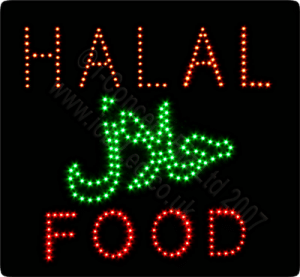Halal certified food is on the upswing
The demand for religious or ideologically prepared food products is nothing new. However in the past, significant changes in the respective market segments – in particular for organic, vegetarian, kosher and halal certified products – could be observed.
Religious denominations in Germany, Austria and Switzerland including the resulting requirements made on food
| Country | Germany | Austria | Switzerland | |
|---|---|---|---|---|
| Religion | People | People | People | Requirement |
| Population in total | 82,000,000 | 8,364,095 | 7,288,000 | |
| Christians | 51,500,000 | 6,512,790 | 5,776,600 | virtually no specific requirements |
| Non-denominational | 26,000,000 | 809,800 | no specific requirements | |
| Muslims | 4,000,000 | 340,000 | 310,800 | halal products |
| Buddhists | 245,000 | 10,400 | 21,000 | mainly vegetarian |
| Jews | 200,000 | 8,140 | 17,900 | kosher products |
| Hindus | 100,000 | 11,000 | 27,840 | mainly vegetarian |
Market aspects
As can be seen from the table, more than 4.6 million Muslims live in the so called D-A-CH countries (Germany, Austria, and Switzerland). Within the EU there are 16 million Muslims and throughout all of Europe approximately 54 million. Even though not all Muslims interpret the halal requirements in the same way and not all Muslims follow these rules strictly, the significance of the halal market is obvious. This is also true for the international markets because there are currently approximately 1.6 billion Muslim consumers in the world and this is also the strongest growing population group with an annual growth rate of approximately 1.84%. The value of the global halal market is estimated to 635bn USD; for Germany this value is about 4bn Euros with most of it being generated in the market for meat and meat products.
Significance of halal
In matters of what is permitted in Islam and what is not, there are three terms that need to be clarified:
· al-halal refers to anything that is considered permissible and lawful in the religion (this means that it has been approved by Allah). “Halal” includes the respective product being produced according to religious rituals, it refers to purity and cleanliness, and thus the product is tahir.
· al-haram is what is forbidden, meaning everything Allah has strictly forbidden. Whoever breaks this rule and does something that is forbidden will be punished by Allah in the kingdom to come and by law in this life.
· Al-makruh describes what is disliked, something that Allah disapproves of although not completely. The trend is towards haram.
Various sources including Quran (religious text of Islam), Sunnah (practices of the Prophet Muhammad), Al-Ijma (the consensus) and Al-Qiyas (process of deductive analogy) are available for the determination on how a certain food product shall be classified.
The most important aspects to be observed in the production of halal food are:
· Exclusive use of hahal raw materials and halal ingredients. This consideration also includes the production conditions (e.g. meat from animals slaughtered according to the basic law of shechita).
· No substance or equipment shall be used that is najis (ritually unclean).
· Prior to the start of production, the equipment and other tools must not be najis and therefore they have to undergo purification to bring them to a ritually clean condition.
· During the entire production process, no contamination with substances/objects is allowed that are haram or najis.
Certification bodies and certification companies can confirm that a company has available and adheres to the conditions needed for halal production. When deciding with whom a company shall cooperate in this field, acceptance criteria should be taken into consideration, in particular, if it is planned to enter the international market. In this case the certification body should be at least approved by JAKIM (Halal Malaysia) or MUI (Indonesian Council of Ulema).
For quite some time now, the organization of the Islamic Conference has been trying to establish a generally applicable halal standard. A general regulation on the use of the term “halal” was compiled, accepted and published by the FAO/WHO Codex Alimentarius Commission in 1997.
Consumers
Kosher and halal certified food products are not only consumed by Jewish and Muslim people. In the US, only one third of all kosher products are eaten by Jews. Another third is used by Muslims because of the likeness of the Dietary Laws. The last third is consumed by vegans and consumers who are convinced that the strict religious rules offer a higher degree of food safety than is provided by governmental rules and controls. This reason is also increasingly mentioned outside the US.
Trend
Attempts to develop “halal” into a general food standard can be observed. Muslims follow the concept of ihsan, which means that everything has to be done to perfection and be best quality and a halal certification has to include the entire production process from the raw materials to the finished products, including transportation, sale and financing. Ultimately this means that aspects such as organic production, fair trade, animal welfare and corporate social responsibility also have to be considered for a halal certification.
Prof. Dr. Herbert J. Buckenhüskes
DLGF e.V., Frankfurt, Deutschland
Contact: H.Buckenhueskes@DLG.org



